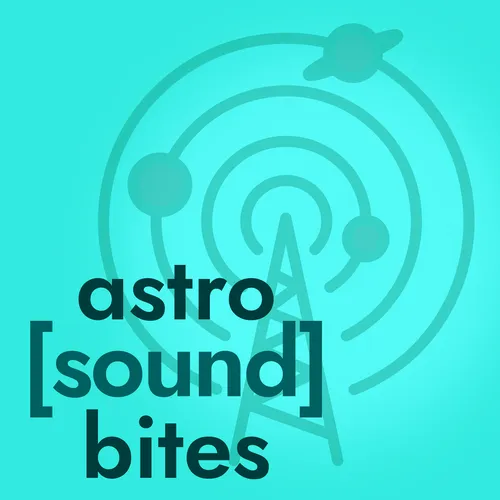![astro[sound]bites - Podcast](https://b2.eachpod.com/podcast-imgs/469bea6f5b8050598de4830685fd6027.webp)
astro[sound]bites
Astrobites for your ears. Three grad students bring you cutting-edge research findings in astronomy and connect the dots between diverse subfields.
- Update frequency
- every 13 days
- Average duration
- 46 minutes
- Episodes
- 121
- Years Active
- 2019 - 2025

Episode 77: The Air out There
We take a deep breath of exoplanet atmospheres, discussing what JWST is capable of and what it already has accomplished using transmission spectroscopy. In this episode, we learn that Sabrina misses …

Episode 76: Black In Astro 2023
Only 1% of Physics PhDs awarded to US citizens were to Black students in 2019 (according to the American Institute of Physics). In celebration of Juneteenth, we’ve invited the Black In Astro team to …

Episode 75: Stellar Snacks
Did you know that talking about astronomy can actually make you hungry? In this episode, Kiersten and Will take us on a culinary adventure through food themed astrobites. Instead of starting with the…

Episode 74: Super Co-Host, Super Alex, Supernova
Before we bid our tearful farewells to Alex, Sabrina and Kiersten present and discuss two of his three publications. We learn how Alex developed and deployed a machine learning model to classify supe…

Episode 73: Astrophysical Prison Break
We’re planning a prison break! But first, we’re consulting the experts on this topic. Sabrina takes us to a distant galaxy cluster to figure out how so much light is escaping. Once we know how it’s b…

Episode 72: A Trip to the Optometrist
In case your graduate student insurance doesn’t cover you over the summer, join us now as we take a quick trip to the optometrist! Kiersten checks the prescription of a neural network in finding stro…

Episode 71: Galaxies Say Halo
Today we say halo from a bird’s eye view of the Universe by exploring some of the largest simulations that exist. Kiersten tells us how cosmological simulations help us study the black hole populatio…

Episode 70: Astronomy 10 Years into the Future Part II
Who knew a decade would fly by so quickly? In the dramatic conclusion of our two-part series, we explore cosmology, supernovae, and galaxy evolution in the year 2033 (or 2034, if you ask Kiersten abo…

Episode 69: Astronomy 10 Years into the Future Part I
What will astronomy be like in the year 2033?
In the first of this two-part series, we predict the (short-term) fate of the solar system, exoplanets, and the culture of astronomy a decade down th…

Episode 68: Breaking the Stigma around Community College Part II
In our second episode taking another in-depth look into community college, we start off by hearing about Sabrina’s experiences. She tells us about her journey from attending high school abroad to sta…

Episode 67: Breaking the Stigma Around Community College Part I
Did you know that half of our astro[sound]bites co-hosts went to community college? We’re here to talk about our experiences and work towards breaking the stigma! This is our first episode in this tw…

Episode 66: B-Field Bonanza
This episode is all about magnetic fields because we couldn’t stay away from such a polarizing topic! Alex takes us on a journey to the center of a star where we find how intense its magnetic field a…

Episode 65: A Tale of Sixes
In this episode, the gang catches multiplicity mania and learn about sextuple systems of stars, galaxies, and planets. Sabrina brings us an astrobite that resonates with us all (or maybe none of us),…

Episode 64: Our Take on Landmark Papers Part II
We’re back with more of the most important papers in our subfields. Sabrina tells us how Karl, an engineer at Bell Labs, became the father of radio astronomy and stole her heart through time and spac…

Episode 63: Our Take on Landmark Papers Part I
Episode 63: Our Take on Landmark Papers Part I
In this week’s episode, we take a deeper look into Alex and Will’s research through two landmark papers in their field. Will pulls out a strip chart t…

Episode 62: Skeletons and Monsters
Halloween is in the air! Get ready for a spoooooky episode where we take a stroll through the haunted side of the Universe. Alex takes us on a trek through a graveyard to investigate the skeletons th…

Episode 61: What’s the Tea on JWST?
The gang is back! In this episode, we take a trip to the largest and the smallest astronomical scales to learn about all the exciting new ways that JWST is transforming the field in its first 100 day…

Sabrina Holds a Press Conference
We’re herded into a crowded auditorium for a press conference held by our very own Sabrina Berger. The breaking news? We’re going on break! But not just that, we’re launching our second sonification …

Episode 60: An Ear for Education (Sonification 2)
It’s time for our jam-packed sonification sequel, which includes two interviews, 5 (!) space sounds, and a critical fourth “i” for how sonification is used in astronomy! We’re first joined by Paul Gr…

Episode 59: Staring into the Voids in the Universe
Is it Halloween yet? This week, Alex, Kiersten, and Sabrina zoom out to stare at the spookiest voids on the most massive scales. Alex tells us how we can use baryonic acoustic oscillations, or BAOs –…